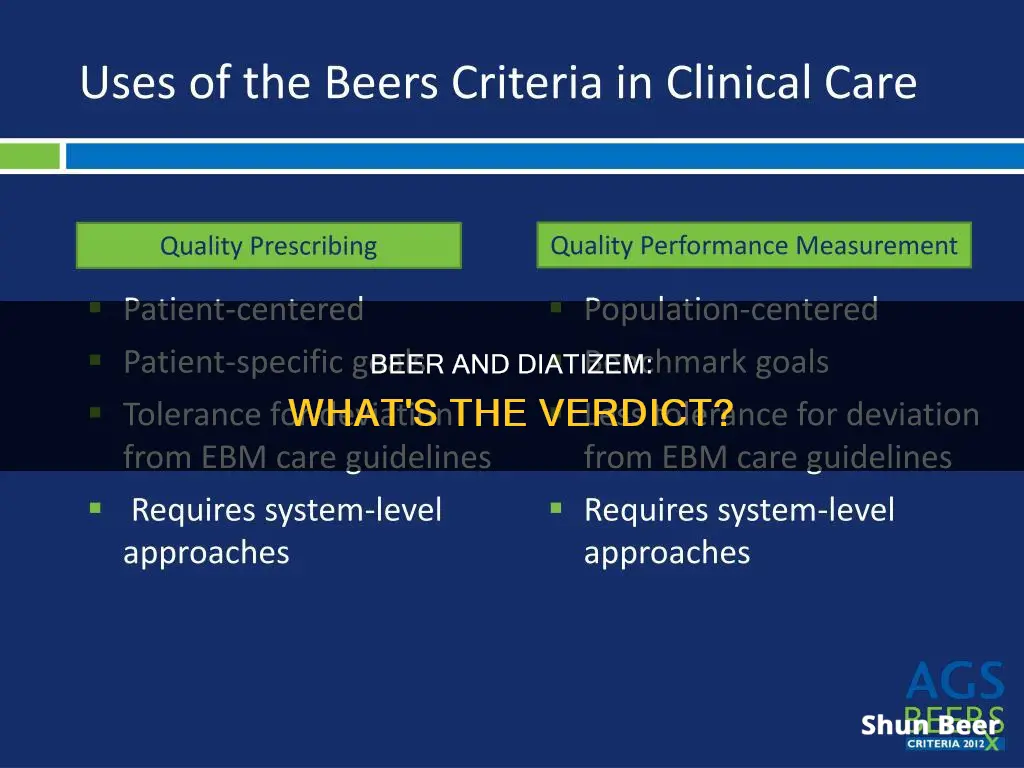
Diltiazem is a medication used to treat high blood pressure and angina, or chest pain. It belongs to a group of medications called calcium channel blockers, which work by relaxing the blood vessels and lowering blood pressure. While it is possible to drink alcohol while taking diltiazem, it is not recommended due to the increased risk of side effects. Combining alcohol and diltiazem can lead to dizziness, lightheadedness, fainting, rapid heartbeat, blurred vision, and impaired thinking. These side effects are due to the additive effects of alcohol and diltiazem on blood pressure, which can result in dangerously low blood pressure or hypotension. Therefore, it is generally advised to avoid alcohol consumption when taking diltiazem, especially when alertness is required.
What You'll Learn
- Drinking alcohol with diltiazem can cause dizziness, fainting and a rapid heartbeat
- Grapefruit juice increases the drug's effects and should be avoided
- Alcohol can negatively impact the conditions diltiazem is used to treat
- Diltiazem is a calcium channel blocker that treats high blood pressure and angina
- Combining beta-blockers and alcohol is not recommended by doctors

Drinking alcohol with diltiazem can cause dizziness, fainting and a rapid heartbeat
Diltiazem is a calcium channel blocker, a drug used to treat high blood pressure and prevent chest pain (angina). It works by relaxing the blood vessels, which helps decrease the amount of work the heart has to do.
Drinking alcohol while taking diltiazem is not recommended. Alcohol can lower your blood pressure and add to the effects of diltiazem. This combination can cause a rapid drop in blood pressure, which can lead to dizziness, lightheadedness, fainting, and an increased heart rate. These side effects are more likely to occur when you first start taking the medication or after a dose increase.
If you are taking diltiazem, it is advised to limit your alcohol intake and be cautious of drinking grapefruit juice or eating grapefruit, as these can also increase the effects of the medication. It is important to consult your doctor if you have any concerns or experience any side effects.
While it is not advisable to drink alcohol while taking diltiazem, if you do choose to drink, it is important to be aware of the potential risks and side effects. Always consult your doctor or healthcare provider for personalized advice regarding medication and alcohol consumption.
The Magic of Mr. Beer Kit: Brewing Simplified
You may want to see also

Grapefruit juice increases the drug's effects and should be avoided
Diltiazem is a medication used to treat high blood pressure and prevent chest pain (angina). It belongs to a group of medications called calcium channel blockers, which work by relaxing the blood vessels and lowering blood pressure.
While drinking alcohol with diltiazem is not strictly prohibited, it is generally advised to avoid it, especially when first starting the medication or after a dose increase. Alcohol can lower your blood pressure and enhance the effects of diltiazem, leading to dizziness, lightheadedness, fainting, or a rapid heartbeat.
Grapefruit juice, including grapefruit-containing foods, can also increase the effects of diltiazem and should be approached with caution. Grapefruit juice may increase the levels of diltiazem in the blood, intensifying its side effects. This occurs because grapefruit juice inhibits the CYP3A4 enzymes in the gut, which are responsible for breaking down drugs and toxins. As a result, more of the drug enters the bloodstream and stays in the body longer, potentially leading to toxic levels.
If you regularly consume grapefruit or grapefruit juice, it is important not to suddenly alter your diet. Consult your doctor or healthcare professional before making any changes to your grapefruit intake while taking diltiazem. They will advise you on how to safely adjust your diet to avoid adverse effects.
The Great American Beer Festival: What's on Tap?
You may want to see also

Alcohol can negatively impact the conditions diltiazem is used to treat
Diltiazem is a medication used to treat high blood pressure and chest pain (angina). It belongs to a group of medications called calcium channel blockers, which work by relaxing the blood vessels and lowering blood pressure. This makes it easier for the heart to pump blood around the body.
Alcohol can negatively impact the conditions that diltiazem is used to treat. Drinking alcohol while taking diltiazem can increase the risk of dangerously low blood pressure. This can lead to dizziness, lightheadedness, fainting, or a rapid heartbeat. These side effects can be particularly pronounced when first starting the medication or after a dose increase.
In addition to increasing the blood pressure-lowering effect of diltiazem, alcohol consumption can also worsen angina. Angina is chest pain that occurs when the heart does not receive enough blood. Drinking too much alcohol raises blood pressure over time and makes heart failure worse. This can further increase the risk of chest pain and other cardiovascular problems.
Furthermore, alcohol can interact with diltiazem to increase the rate at which some controlled and extended-release formulas of the drug are released. This can lead to more rapid absorption and an increase in systemic exposure to diltiazem, potentially resulting in adverse reactions.
Therefore, it is generally recommended to avoid alcohol consumption while taking diltiazem. It is important to consult with a healthcare professional to understand the specific risks and recommendations regarding alcohol intake while taking this medication.
Beer Drop: How Does the Subscription Work?
You may want to see also

Diltiazem is a calcium channel blocker that treats high blood pressure and angina
Diltiazem is a medication used to treat high blood pressure and angina (chest pain). It belongs to a class of medications known as calcium channel blockers, which work by relaxing the blood vessels and reducing the workload on the heart. This helps to lower blood pressure and increase the supply of blood and oxygen to the heart, thereby preventing chest pain.
Diltiazem achieves this by blocking calcium from entering the muscles in the heart and blood vessels. Calcium is necessary for muscle cells to contract, so blocking it causes the muscles to relax. This, in turn, lowers blood pressure and makes it easier for the heart to pump blood throughout the body.
In the case of angina, diltiazem improves blood supply to the heart. Angina occurs when the heart muscles do not receive enough blood, usually due to hardened and narrowed arteries. By widening these arteries, diltiazem ensures more oxygen reaches the heart, thus preventing chest pain.
Diltiazem is typically taken orally, and it may be prescribed as a regular tablet or an extended-release tablet or capsule. It is important to follow the directions on the prescription label and take diltiazem exactly as directed by your doctor. Do not stop taking the medication without consulting your doctor, as stopping diltiazem may cause your blood pressure to rise, increasing the risk of a heart attack or stroke.
It is worth noting that alcohol consumption can interact with diltiazem. Alcohol can lower blood pressure and enhance the effects of the medication, leading to dizziness, lightheadedness, fainting, or a rapid heartbeat. Therefore, it is generally recommended to avoid drinking alcohol while taking diltiazem, especially when starting the medication or after a dose increase.
Wet Paper Towel on Beer: Does This Method Work?
You may want to see also

Combining beta-blockers and alcohol is not recommended by doctors
Diltiazem (Cardizem) is a calcium channel blocker that treats high blood pressure and prevents chest pain (angina). It works by relaxing the blood vessels, which helps decrease the workload of the heart. While drinking alcohol while taking diltiazem is not recommended, it is not forbidden. However, it is important to be aware of the potential risks and side effects.
When beta-blockers are combined with alcohol, it can lead to unpleasant and sometimes dangerous side effects. Alcohol can increase the heart rate and cause an irregular heartbeat, which may worsen the issues that beta-blockers are prescribed to treat. Additionally, alcohol can affect the heart rate and rhythm and further lower blood pressure. This interaction can lead to increased dizziness, lightheadedness, and heart rate changes, which can be challenging to predict.
The combination of beta-blockers and alcohol can also lead to a dangerously low blood pressure level, known as hypotension. This condition can cause symptoms such as dizziness, nausea, and fainting. Furthermore, alcohol can decrease the effectiveness of beta-blockers and increase the risk of side effects. It may also affect the release of the medication into the body or the speed at which the body metabolizes it.
In conclusion, while drinking alcohol while taking diltiazem is not strictly prohibited, it is important to exercise caution and be aware of the potential risks and side effects. Combining beta-blockers and alcohol is generally not recommended by doctors due to the potential negative impact on heart rate, blood pressure, and other related conditions. It is always advisable to consult a healthcare professional to discuss the risks and benefits and determine the healthiest plan for the individual.
Mixing Beer and Nyquil: Safe or Risky?
You may want to see also
Frequently asked questions
Although you can drink alcohol with Diltiazem, it is not recommended. Alcohol can increase the blood pressure-lowering effect of the drug, which may make you feel dizzy or light-headed. In some cases, it can even lead to fainting, a rapid heartbeat, or blurry vision.
Diltiazem may trigger side effects such as swollen hands, ankles, or feet, headaches, fatigue, light-headedness, redness of skin, hot flushes, indigestion, and constipation. Serious but rare side effects include the whites of the eyes turning yellow, severe pain in the stomach, or yellowish skin.
Grapefruit juice is not recommended as it can increase the blood level of the drug and enhance its effects.
Diltiazem starts to work on the day you take it, but for conditions like high blood pressure and angina, it may take a couple of weeks to work fully.
If you choose to drink alcohol while taking Diltiazem, ensure that you drink plenty of fluids and rest. Avoid situations where you need to be alert, as the combination may cause impairment in thinking and concentration.







